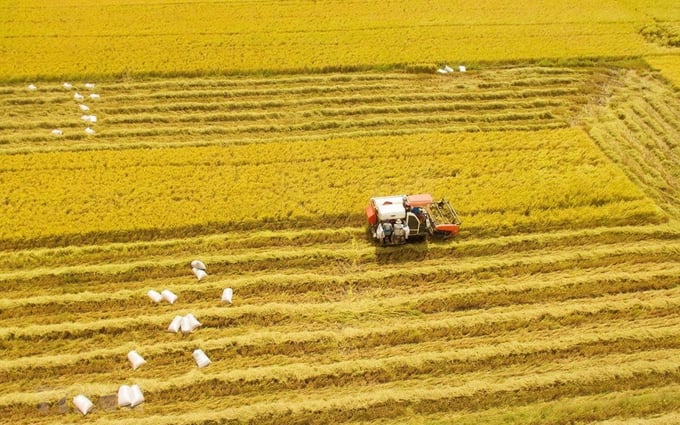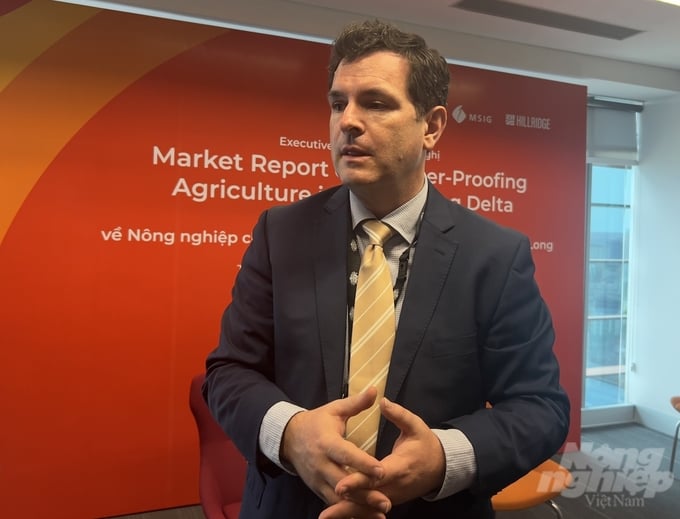December 18, 2025 | 13:41 GMT +7
December 18, 2025 | 13:41 GMT +7
Hotline: 0913.378.918
December 18, 2025 | 13:41 GMT +7
Hotline: 0913.378.918

According to the Market Report, rice production activities in An Giang province face significant climate change risks in July and August, whereas rice production activities in Kien Giang province is vulnerable to the impacts of climate change in October and November. Photo: Le Hoang Vu.
During a meeting at the Australian Consulate General in Ho Chi Minh City on May 28, Mr. Dominic Balasuriya, Economic Consul at the Department of Foreign Affairs and Trade of Australia (DFAT), stated that the world is shifting its attention towards in-depth research in order to mitigate the impacts of climate change, and explore climate change adaptation solutions.
The Australian government introduced a new development policy in 2023, identifying climate change and gender equality as the focus of all strategies in the foreseeable future.
"We are seeking new technologies such as commercially viable solutions to support small-scale, local farmers in the current global context; and respond to the impacts of climate change with a focus on achieving net-zero emissions," emphasized Mr. Dominic Balasuriya. He leads an action team for an Australian government initiative titled Business Partnerships Platform (BPP), which aims to develop innovative business initiatives in the Mekong Delta region.
According to the Market Report on Weather-Proofing Agriculture in the Mekong Delta, the Mekong Delta is a key agricultural production area within Vietnam. However, the region is facing severe climate risks, including irregular rainfall, high temperatures, storms, droughts, and saltwater intrusion.
Facing climate change, farmers whose livelihoods primarily depend on agriculture and aquaculture are the most vulnerable.
The report indicated that nearly half of the total production value in the Mekong Delta region is relatively resilient to severe climate phenomena, including production value from fish farming, indoor and greenhouse production, dry season production in irrigated, non-coastal areas.
However, other agricultural and aquaculture production models are susceptible to climate risks. Among this group, a production value of up to 6.8 billion USD is eligible for index insurance.
The report also provided an analysis on the agricultural environment in the Mekong Delta. Accordingly, the analysis highlighted rice, mangoes, durians, dragon fruits, oranges and shrimp as the most suitable products for index insurance due to their sensitivity to climate risks.
According to the report, index insurance can be an important solution in mitigating climate risks, and establishing a protection network against the impacts of severe climate phenomena for farmers in the Mekong Delta.

Dale Schilling, CEO and Founder of Hillridge Technology Pty Ltd. Photo: Nguyen Thuy.
Dale Schilling, CEO and Founder of Hillridge Technology Pty Ltd, revealed that approximately 40% of the total agricultural production value in the Mekong Delta can be protected by index insurance. Products under index insurance can mitigate climate risks by triggering an automatic payment system when rainfall or temperature thresholds are exceeded without the need for extensive damage assessments. This approach allows farmers and aquaculturists to receive compensation to restore production immediately after a natural disaster.
This initiative is part of a collaboration project between Hillridge, MSIG Vietnam, and DFAT, under the Business Partnerships Platform program, aimed at developing and promoting insurance solutions tailored to the needs of farmers in the Mekong Delta.
An important aspect of the project is to enhance insurance access for smallholder farms led by women and other vulnerable groups heavily affected by climate change but lacking resources to recover from its impacts.
Cargill Group and the Asia Society for Social Improvement and Sustainable Transformation (ASSIST) announced their partnership and launched the Aqua Xanh project on May 8 in Ca Mau city. Accordingly, the project aims to reduce water pollution by promoting the implementation of sustainable aquaculture practices in the Mekong Delta.
The Aqua Xanh project will be implemented from May 2024 to July 2026, with the primary objective of reinforcing climate change resilience. The project will undergo a pilot phase in Cai Nuoc district, Ca Mau province, as a precursor to potential expansion into other regions.
The project is consistent with Cargill's global sustainable development objectives by positively impacting water sources, supply chains, and local communities throughout its operation.
The Aqua Xanh project aims to address climage challenges by promoting sustainable water usage and waste management practices in the Mekong Delta's fisheries sector. One of the project's objectives is to enhance farmers' capacity through training and technical support in sustainable practices in accordance with the standards set by the Aquaculture Stewardship Council (ASC).
Translated by Nguyen Hai Long
/2025/12/17/0042-2-075234_14.jpg)
(VAN) In Vinh Long, high-quality, low-emission rice models are being scaled up from cooperatives, helping reduce production costs, increase farmers' incomes, and protect the environment.

Professor Nguyen Duc Ngu, the third generation of leaders since the establishment of Vietnam’s Hydrometeorology sector has witnessed and lived through the long arc of its development.

(VAN) Climate change, saline intrusion, and unsustainable farming practices are depleting agricultural land in the Mekong Delta. Restoring soil health is a key solution for the future of agriculture.

(VAN) Agroforestry coffee not only enhances coffee quality but also helps farmers in Quang Tri enter carbon credit market with high expectations.

(VAN) Towards Net Zero 2050, fertilizer manufacturers are proactively developing bio-based products, reducing emissions, and demonstrating responsibility to the environment.

(VAN) The smart rice cultivation model, which reduces methane emissions and aims at developing agricultural carbon credits, has been deployed in Thai Nguyen province and delivered positive results.

(VAN) The purpose of this visit is to unify the proposal for a technical assistance project supporting sustainable agricultural and forestry development in Angola.